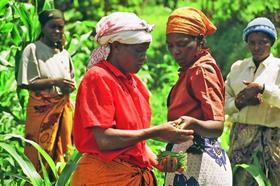
Charity organisation Oxfam has hit out at the lack of transparency and favouring of big business by the New Alliance for Food Security and Nutrition, a G8-led initiative to attract private sector investment in agriculture.
The New Alliance was launched in 2012, since which time Oxfam America has participated in the Leadership Council to provide guidance.
However, Oxfam has criticised the group's vision of agricultural development, stating that it raised concerns.
'Policy commitments made by African governments under the initiative aim to create an ‘enabling environment’ for businesses and larger enterprise, rather than prioritising the needs of small-scale farmers or smaller enterprise working in the food system,' wrote Tim Gore, Oxfam International's head of policy, advocacy and research on its GROW Campaign.
According to the recent New Alliance Progress Report, African governments have committed to over 200 policy changes as part of the initiative, including to land legislation, trade policy, taxation and seed laws. Oxfam fears such changes could 'tip the balance' of investment towards larger players rather than small-scale producers and family farmers, and could harm the environment through an industrial, high-input model of agriculture.
'In particular, any attempts by governments and donors to transfer land to investors places communities at severe risk of dispossession or expropriation from land,' Gore stated. 'In addition, the adoption of strict intellectual property rights such as UPOV 1991 could undermine the rights of small-scale producers to develop, save, re-use or exchange or sell seeds, with negative implications for food security.'
The recent meeting of the Council in New York on 22 September marked Oxfam America's final participation, although it will continue to press for reforms, it said.
'Two years after its inception, the New Alliance remains a flawed political process,' Gore concluded. 'On the country level, so-called cooperation framework agreements have been developed through roundtable discussions with a small group of donors, government representatives, and well-connected national and international companies, rather than through democratic and transparent policy decision-making.
'The voices of farmer’s organisations, women’s producer groups and civil society organisations and CSO groups have, on the whole, been ad hoc and inadequately integrated into this policy planning. Oxfam research in Malawi, Burkina Faso and Ghana has illustrated some of these concerns. This flaw leads to serious concerns that the priorities of the Alliance reflect the interests of its more powerful members.'
Gore went on to offer suggestions on the Alliance's reform, including a review of all policy commitments and investments, the exploration of alternative business models and forms of support, and a guarantee of transparency and accountability.



